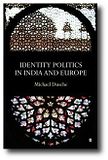Identity Politics in India and Europe
Dusche, Michael:
Identity politics in India and Europe / Michael Dusche. - Los Angeles ; London ; New Delhi [u.a.] : Sage, 2010. - XV, 375 S.
ISBN 978-81-321-0304-2
Rs. 850,00 (Sage India)
US$ 49,95 (Sage USA)
DDC 305.800954
Bescheibung
This book highlights the present perceptions of the East and the West as seen through the eyes of eminent scholars from India, and in doing so, theorises on identity politics.
Identity Politics in India and Europe combines qualitative methods (20 interviews) with historical and philosophical analysis. The first part of the book discusses the history of perceptions between the Europe of Latin Christianity and the so-called Muslim world, starting from the 7th century onwards. The second part is devoted to a discussion on the emergence of modernity and how it changed the identity politics of earlier times. The third part explores the role that intellectual elites have to play. It comprises interviews of eminent scholars and thinkers in India such as Imtiaz Ahmad and Ashis Nandy. These make for an insightful read, especially as subtle ideological differences surface in their responses to a set of common questions.
The interviews are set in the historical context of the relations between Europe and the Muslim world and analysed from a theoretical angle, drawing from theories of modernity, conceptions of justice and notions of identity politics. [Verlagsinformation]
Inhalt
Acknowledgements. vii
Introduction. xi
PART I: "EUROPE" AND "THE MUSLIM WORLD": A BRIEF HISTORY OF RECIPROCAL PERCEPTIONS
- Late Antiquity to the Beginnings of the Modern Era. 1
- Encounters in the Late Roman World. 8
- Islam in Western Europe: Al-Andalus. 26
- Encounter in the Levant: the Crusades. 36
- At the gates of Vienna: the Ottomans in Europe. 42
- The Reformation: Ushering in the Modern Era. 45
PART II: THE GLOBAL CONDITION: MODERNITY AND ITS CRITICS
- Culture and Identity in Modern Politics. 51
- The World Polity Approach. 56
- Institution. 57
- Decoupling. 60
- Actor and Action. 62
- Rationality and Rationalisation. 63
- Religion and the ‘Religious’. 64
- Progress and Teleology. 67
- Principal and Agent. 69
- Scientific Rationality. 71
- The Modern Self. 73
- The Liberal System Globalised. 75
- The World Polity. 77
- Diffusion. 78
- The Statelessness of the World Polity. 79
- Inclusion and Exclusion. 83
- Identity. 84
- Language. 88
- Culture. 90
- The Political. 92
- Inclusive versus Identity Politics. 95
- Identity Politics in Europe. 103
- Identity Politics in India. 111
- Freedom to Non-development. 114
- Development as Freedom. 119
- Identity Politics and the Ramjanmabhumi Movement. 121
PART III. INTELLECTUAL ELITES AND NORMATIVE ORDERS IN INDIA, ISRAEL, PALESTINE AND TURKEY
- Introduction: Survey and Interviews. 133
- Ashok Acharya. 144
- Imtiaz Ahmad. 153
- Anwar Alam. 162
- Rajeev Bhargava. 169
- Asoke Bhattacharya. 182
- Anil Bhatti. 185
- Roma Chatterji. 193
- Asghar Ali Engineer. 203
- Anjan Ghosh. 211
- Qutub Kidwai & Shirin Huda. 218
- Gurpreet Mahajan. 233
- Shail Mayaram. 242
- Deepak Mehta. 250
- Salil Misra. 256
- Ashis Nandy. 280
- Aditya Nigam. 289
- Devdutt Pattanaik. 300
- Dhruv Raina. 308
- Ruby Sain. 317
- Zeenat Shaukat Ali. 322
- Virginius Xaxa. 334
Appendix: Binary Oppositions in Counter-hegemonic Discourse. 351
References. 361
Index. 369
Autor
MICHAEL DUSCHE, Jawaharlal Nehru University, New Delhi. Homepage.
Quellen: Sage India; Sage USA; Vedams Books; WorldCat.
Ähnlich
- Stockhausen: Imag(in)ing the Nagas
- Viswanath: The Pariah Problem
- Sohi: Echoes of Mutiny
- Migration and Religion in Europe
- Swank: Rewriting Shangri-La
- Modern Anthropology of India
- The Jews of Andhra Pradesh
- Citizenship as Cultural Flow
- Sharma: From This World to the Next
- Kortländer: Parlament für eine Milliarde

